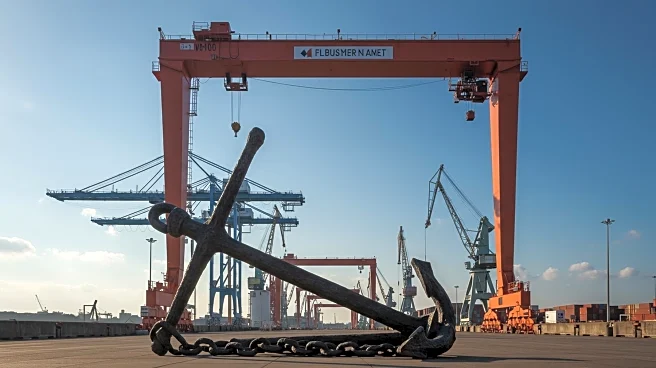What's Happening?
Gladding-Hearn Shipbuilding, a family-owned shipyard in Somerset, Massachusetts, is experiencing growth and expansion under the leadership of Peter Duclos, the President and Director of Business Development. The shipyard, founded in 1955, occupies 6.5 acres on the Taunton River and employs around 80 skilled workers. It has delivered over 180 commercial vessels, including tugs, ferries, and pilot boats. The company has leveraged the Maritime Administration's Small Shipyard Grant Program to enhance its capabilities, securing four grants since 2008. These grants have funded significant upgrades, such as a welder training facility and a 35-ton yard transporter. Duclos highlights the importance of continuous workforce training to sustain growth in the maritime industry.
Why It's Important?
The expansion of Gladding-Hearn Shipbuilding is significant as it aligns with the Trump Administration's focus on revitalizing the maritime industry. This policy shift has brought attention to shipbuilding, potentially benefiting small and medium-sized shipyards like Gladding-Hearn. The company's ability to secure grants and invest in infrastructure improvements positions it to remain competitive in a challenging market. The emphasis on training and workforce development is crucial for sustaining growth and innovation in the maritime sector, which is vital for national economic and security interests.
What's Next?
Gladding-Hearn Shipbuilding is poised to benefit from ongoing support for MARAD programs, such as Title XI financing and the Capital Construction Fund. The company aims to continue leveraging these programs to enhance its capabilities and workforce training. As the national maritime policy evolves, Gladding-Hearn anticipates further opportunities to align its craftsmanship with industry revitalization efforts. The shipyard's focus on customer-driven innovation and tailored vessel designs will likely continue to drive its success in the niche market.
Beyond the Headlines
The Trump Administration's prioritization of maritime matters represents a rare shift in national policy, potentially leading to long-term benefits for the industry. The focus on small shipyards and workforce development could foster a more sustainable and competitive maritime sector. Gladding-Hearn's iterative, customer-driven model exemplifies how small businesses can adapt and thrive amid policy changes, highlighting the importance of listening to customer needs and continuously improving products.










